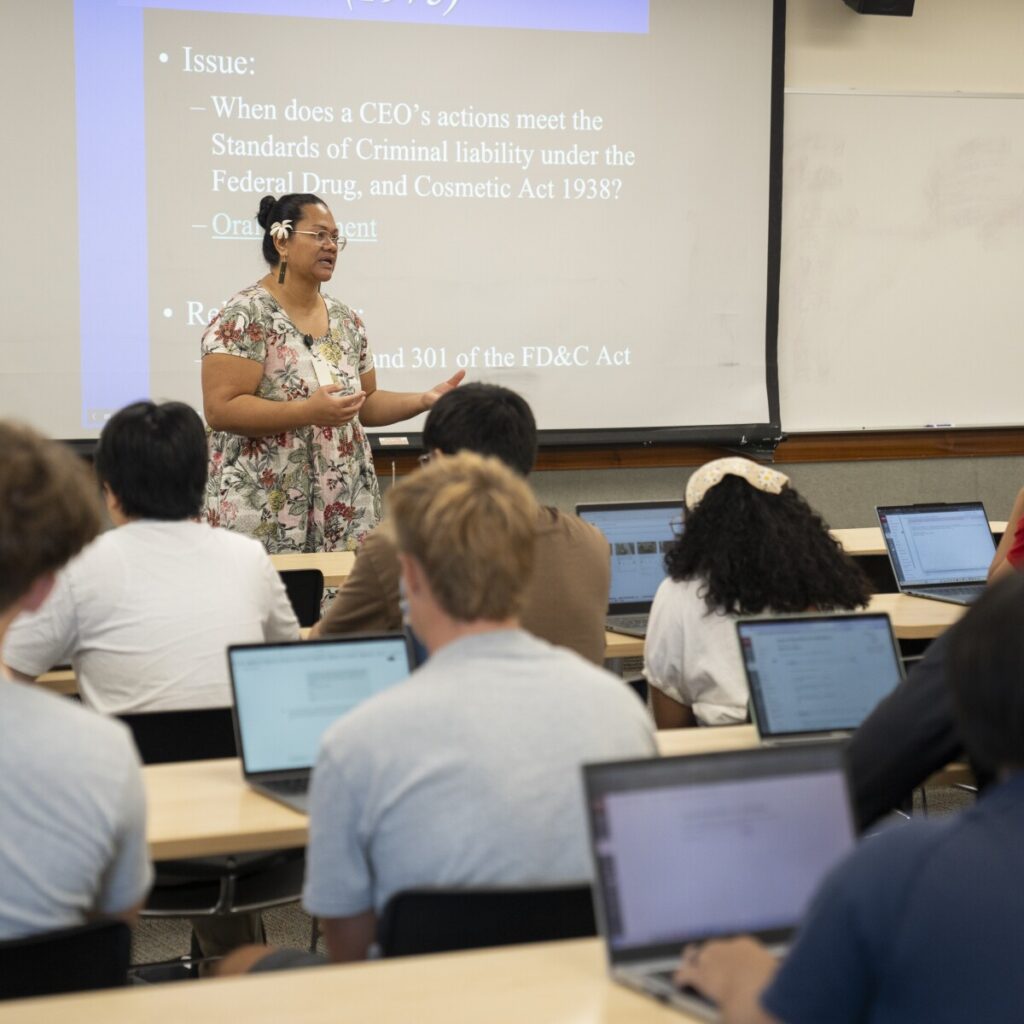Moana Numanga, assistant professor in the School of Business and Government, teaches a class on ethics and the legal environment.
Photo credit: Camille Jovenes
Heather Walker said majoring in intercultural peacebuilding and political science helped her develop a hopeful outlook on politics and learn how to build communities more closely aligned with the teachings of Christ. she said. Like Walker, a fourth-year student from California, two current BYU-Hawaii students and two political science alumni said they felt politics had the potential to be used for the common good. I’m sharing it.
Mari Kojima, a BYUH graduate from Japan who studied intercultural peacebuilding, emphasized how Christ’s teachings of unconditional love can be found in politics. “I feel that political science has given me the training to accept and explore other people’s perspectives,” she said. “Our beliefs mean the world to us, so we need to respect the way others think and feel, because when we deny[their perspective]it’s as if their world is unfair.” Because you might end up hurting them.”
Rachel Akana, a BYUH graduate from the Big Island who studied political science and social work, echoed Kojima in saying that studying political science “allows you to do a better job of bringing people together through understanding.” It develops our empathy, compassion and patience towards people. ” Both Akana and Kojima emphasized how studying political science can humanize other perspectives and lifestyles and bring diverse communities together more lovingly. Akana said politics and history are intertwined and understanding these two areas can strengthen communities through a life dedicated to public service. “Political science is very good at recognizing our predecessors, where we are now, how we can move forward, and what we can do to help each other. ” she explained.
Camila Marie Fajardo, a BYUH fourth-year political science major, commented: Political science not only helps you better understand the laws of the land, but also helps you understand how communities function. It helped me understand why wars happen and what we can do to build peace. ” She also said majoring in political science helped her understand how the law can be used to serve others and spread the love of God.
Just as Fajardo pointed out the value of being a good citizen, Bilai Ilorahia, a current fourth-year political science student from Tonga, feels that the realm of politics cannot be inherently evil. He said he is doing so. These are people who did not follow the Jewish faith. His point was to focus on the Lord in order to go to the Father. Ilorahia also said that political science “taught (him) how to identify leaders who are for the people and leaders who are in it for personal gain,” adding that political science “taught him how to identify leaders who are in it for personal gain,” and who individuals elect. He emphasized how the spiritual gift of insight can be used in deciding what to do. Public office.
Political science students study in classrooms located on BYUH’s campus.
Photo credit: Camille Jovenes
Walker said political science has helped him become a better disciple of Jesus Christ because “a lot of political science is focused on meeting people’s needs with available resources.” , she said, is what God does for His children. The church is the most influential way to build the kingdom of God. Governments are established to help people and improve their quality of life. That is exactly what Christ requires of us when we enter into a covenant with God. ”
Being at BYUH has given Fajardo a more hopeful outlook on politics, she said. “Our teachers don’t just talk about[what’s going on in the world]they teach us how to change it to make the world a better place,” she said. He also said that being in a school with students from dozens of different nationalities and cultures helps the community learn how “we can come more together rather than separate.” Ta. “We live in this world together. We have to find ways to work together. It will never be a world of just one country or one culture, so we She said BYUH is a university that excels at building cross-cultural dialogue and cooperation.
Akana said living in Laie helped her learn how she could contribute to her home community in Hawaii. “I was able to hone my cultural heritage here by rubbing shoulders with community leaders,” she said. She provided specifics on how to teach Pacific Island-based cultural education and reminded us that all peoples of the Pacific are connected. “They continue to focus on ancestral knowledge and write a comprehensive strategy for how our (Asian American and Pacific Islander) communities can thrive within our culture. I am so grateful for the work they do inside and outside the church.”
But she said she doesn’t care what the term “political science” sometimes stands for. “Our system is nothing without community and culture. It takes a village. To qualify everything as a power system discounts our communities,” she points out. did. Despite the complex nature of politics, she said she is grateful for the opportunity to study at BYUH. Because it “helped me create a space to explore the knowledge passed down from my ancestors and deepen that understanding in my work, education, family, family, and community.” ”

